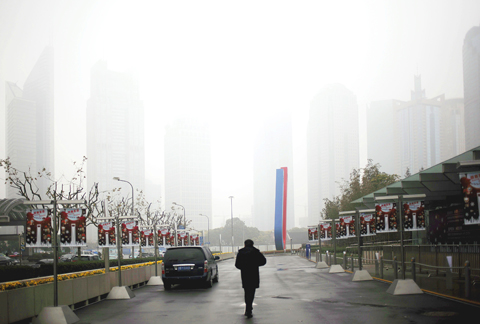China has moved to support its economic recovery by extending tax cuts and subsidies for purchases of small vehicles and appliances, while adjusting some measures to counter rising property prices.
Wednesday’s announcement follows China’s annual economic strategy meeting, with leaders promising on Monday to keep economic stimulus and easy credit policies in place.
Domestic demand is seen as crucial for future growth, but economists say consumer spending accounts for less than half of China’s economic activity.

PHOTO: BLOOMBERG
The State Council statement posted online on Wednesday says China should continue its current policies, including subsidies, to push consumption.
A tax cut on sales of cars with engines of 1.6 liters or smaller was extended until the end of next year, but the tax was raised to 7.5 percent from the current 5 percent — a rate slashed by half earlier this year to counter a slump in sales due to the global downturn.
Subsidies would be raised from the current rate of up to 5,000 yuan (US$878) to as high as 18,000 yuan for purchases of some vehicle models. But they do not apply to any vehicles with engine capacity bigger than 2 liters, the statement said.
The announcement was a further boon to automakers who have done a booming business this year, with total sales exceeding 12 million units by last month, up 42 percent over a year earlier, the China Association of Automobile Manufacturers said. Of that total, 85 percent have been small vehicles.
In a move aimed at countering speculation in real estate that has drawn complaints that housing prices are becoming unaffordable for many families, the government reintroduced a 5.5 percent business tax on sales of homes bought less than five years earlier.
The tax had been suspended last year as property sales slumped as the economy slowed due to plunging exports.

Authorities have detained three former Taiwan Semiconductor Manufacturing Co (TMSC, 台積電) employees on suspicion of compromising classified technology used in making 2-nanometer chips, the Taiwan High Prosecutors’ Office said yesterday. Prosecutors are holding a former TSMC engineer surnamed Chen (陳) and two recently sacked TSMC engineers, including one person surnamed Wu (吳) in detention with restricted communication, following an investigation launched on July 25, a statement said. The announcement came a day after Nikkei Asia reported on the technology theft in an exclusive story, saying TSMC had fired two workers for contravening data rules on advanced chipmaking technology. Two-nanometer wafers are the most

NEW GEAR: On top of the new Tien Kung IV air defense missiles, the military is expected to place orders for a new combat vehicle next year for delivery in 2028 Mass production of Tien Kung IV (Sky Bow IV) missiles is expected to start next year, with plans to order 122 pods, the Ministry of National Defense’s (MND) latest list of regulated military material showed. The document said that the armed forces would obtain 46 pods of the air defense missiles next year and 76 pods the year after that. The Tien Kung IV is designed to intercept cruise missiles and ballistic missiles to an altitude of 70km, compared with the 60km maximum altitude achieved by the Missile Segment Enhancement variant of PAC-3 systems. A defense source said yesterday that the number of

A bipartisan group of US representatives have introduced a draft US-Taiwan Defense Innovation Partnership bill, aimed at accelerating defense technology collaboration between Taiwan and the US in response to ongoing aggression by the Chinese Communist Party (CCP). The bill was introduced by US representatives Zach Nunn and Jill Tokuda, with US House Select Committee on the Chinese Communist Party Chairman John Moolenaar and US Representative Ashley Hinson joining as original cosponsors, a news release issued by Tokuda’s office on Thursday said. The draft bill “directs the US Department of Defense to work directly with Taiwan’s Ministry of National Defense through their respective

Tsunami waves were possible in three areas of Kamchatka in Russia’s Far East, the Russian Ministry for Emergency Services said yesterday after a magnitude 7.0 earthquake hit the nearby Kuril Islands. “The expected wave heights are low, but you must still move away from the shore,” the ministry said on the Telegram messaging app, after the latest seismic activity in the area. However, the Pacific Tsunami Warning System in Hawaii said there was no tsunami warning after the quake. The Russian tsunami alert was later canceled. Overnight, the Krasheninnikov volcano in Kamchatka erupted for the first time in 600 years, Russia’s RIA